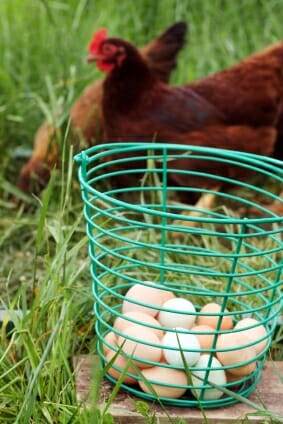 If, as part of your emergency preparedness, you have been considering options for creating a long- term, sustainable food source, chicken farming has proven to be one of the best. As an ongoing source of nutrient-rich eggs and lean meat, raising chickens for food is within the reach of anyone with the space to house them. It’s not without its challenges, however, so it would be wise to understand all that goes into raising chickens for food.
If, as part of your emergency preparedness, you have been considering options for creating a long- term, sustainable food source, chicken farming has proven to be one of the best. As an ongoing source of nutrient-rich eggs and lean meat, raising chickens for food is within the reach of anyone with the space to house them. It’s not without its challenges, however, so it would be wise to understand all that goes into raising chickens for food.
If it were as easy as setting up a coop and then running down to the feed store to scoop up a brood of chicks, then many preppers would be doing it. In addition to knowing which breed is farm friendly, the chicken farmer must be ready to cope with the daily ordeal of feces covered eggs, the unruly behavior of renegade roosters, and unproductive chickens.
The very first mistake to avoid is to purchase “factory” chicks that are bred for mass egg production. If placed in a small farm setting, these chickens will not likely come home to roost. In other words, while they may be great egg layers, they lack the brooding instincts to hatch the eggs. Commercial egg production farms have their own mechanisms for hatching the eggs, so these chickens are not “engineered” to do so.
The best place to find chickens with natural reproductive instincts are at the smaller farms. Small chicken farmers often run into an over-capacity situation where their chicken population exceeds the space available.
If you can find the Bantam variety of chickens, you’ll be rewarded with dependable setters that will produce constant flow of eggs. Bantam chickens are smaller than other varieties of full-sized chickens so, if you’re also looking to raise chickens for meat, you might consider mixing varieties for cross breeding that will result in a larger reproductive brood.
You will also need to plant a couple of roosters. This is where the trials and tribulations begin to occur. We’ve all heard stories about how downright nasty roosters can be. Again, if you rely upon mass- produced varieties, you’re likely to run into some very unruly roosters. The same small farms that raise domesticated chickens will often have roosters that have been tempered through a nurturing relationship with their mother hens. If you find that one of your roosters has a bad temperament, you should yank them from the brood immediately, or you’ll end up with more chaos than eggs.
You will need to decide if you want to raise your chickens as “free range” or as cooped chickens. Free range means allowing the chickens to roam your property feeding off of the seeds, seedlings and insects found in your gardens. Free range chickens tend to produce a healthier variety of eggs and lean meat; however, they can also cause chaos in your yard. If you have an large area that can be devoted to farming free-range chickens without regard to the mess that will ensue, that would be ideal.
There is some training involved, especially if you hope to keep the chicken poop out of the eggs. The chicken house should be big enough to house both the nesting boxes and a chicken lounge, or rest area. Unless there is a separate, comfortable place where the chickens can hang out, such as a perch, the nesting box may end up as a latrine as well. Speaking of chicken poop, the manure can be used as a fertilizer for the garden.
By following the tips offered here you can minimize the trial and error and have a 24/7 food source that operates fairly efficiently. Solving for the rooster issues and the poop problem, your primary job becomes egg collection. When everything else goes awry, your chicken farm will be the food source that keeps on giving.
Other articles in this issue:
- Is Your Arsenal Up to the Task?
- For Nutrition on the Run – Eat Like Davey Crockett
- Reality Shock: Your Hospital May be Killing You
If you liked this article you may be interested in this product from our sponsor.

 Off The Grid News Better Ideas For Off The Grid Living
Off The Grid News Better Ideas For Off The Grid Living



